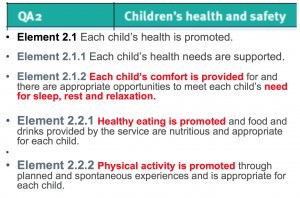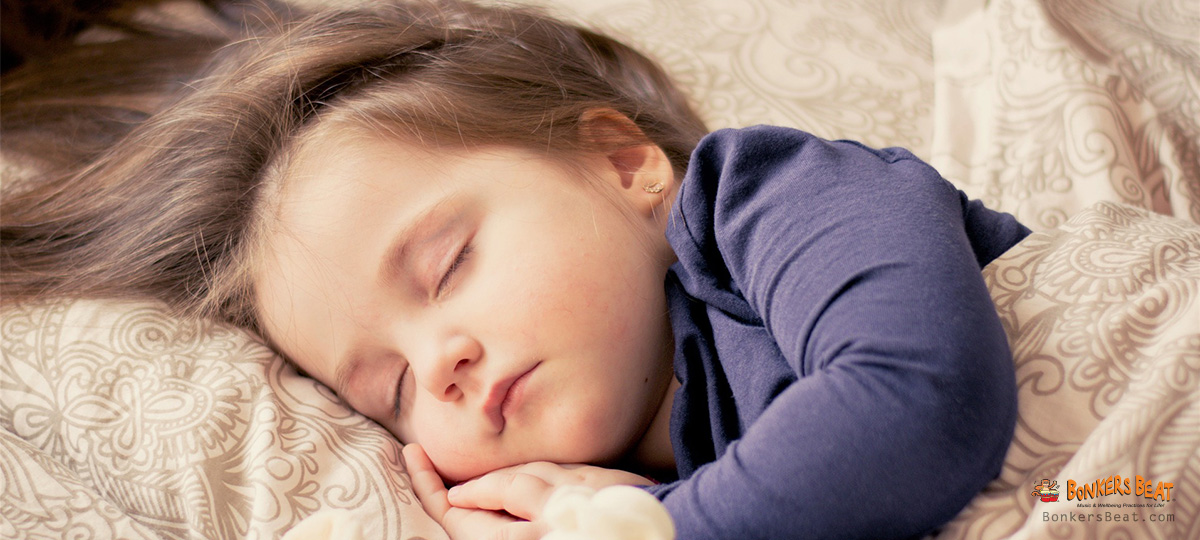How much sleep do children need to play, learn and grow? It’s often underestimated.
Most experts agree on the following:
Toddlers (aged 1 to 3 years): From 10 – 13 hours, which includes a day nap of 1 – 3 hours. Young toddlers may still take two naps but late afternoon should be avoided to avoid difficulties getting to sleep at night.
Preschoolers (aged 3 – 5 years): 10 – 12 hours per night, plus an afternoon nap of 1-2 hours.
School aged (5 years +): 10 – 12 hours each night.
Educators should remember that the National Quality Standards Quality Area 2, Element 2.1.2 specifically refers to centres making sure that “each child’s comfort is provided for and there are appropriate opportunities to meet each child’s need for sleep, rest and relaxation, which in turn directly supports Element 2.1 as a whole – promoting the health of the children. (See below from NQS Quality Areas).

The amount of sleep different children require is, as with adults, an individual thing. There should, however, still be an emphasis on ensuring that children are sleeping enough, resting enough and that these are quality sleeps and rests to maximise what your child/ren can get out of every day.
Don’t Neglect Naps
To get enough sleep, naps are a must for most children right through to age 5. As much as we tend to realise that the body needs sleep to physically rejuvenate us it also helps children to grow and assists the immune system. Our brains also rely on sleep to function properly – researchers often say that they believe the brain uses sleep to sort through information, solve problems, organise your thoughts and generally restore itself.
Naps are important for children to enjoy happy, active days – without a nap, children can become overtired, moody and even struggle with falling asleep at night.
Spot the Sleepy Signs
It is safe to say that fulfilling the sleep and rest quota each day for children is imperative to their overall ability to function, both physically and mentally. It’s not surprising that children who don’t get enough sleep or rest time can be irritable and struggle to concentrate and perhaps feel clumsy.
Babies and younger toddlers may display the following:
Yawning
Crying
Eye rubbing
Irritated behaviour
Toddlers and young children may display:
Clumsiness
Eye rubbing
Yawning
Emotional distress
Irritated behaviour
We all know that sometimes it can be a challenge to get children to sleep even when they are obviously tired, but here are some strategies to try.
Four Tips to Promote Sleep
1. Keep up a regular routine where children can come to understand that rest or sleep time is approaching. Routine can help children mentally and physically prepare;
2. Try some relaxation exercises or reading a book in the lead up;
3. Make sure children get ample fresh air and physical activity;
4. Ensure children are comfortable and not hungry, thirsty etc before they settle down to rest/sleep.
It is so important to remember that even if children are sleeping well overnight, a day nap and/or rest is necessary right up to school age. Periods of napping, rest and relaxation are essential to maintain those high energy levels all day long.
Don’t forget to look at your own sleep patterns too – even adults can improve the way we function in our daily lives simply from ensuring we get a decent amount of sleep and that it’s quality sleep and rest. After all, you need all the energy you can muster to keep up with the kids!

